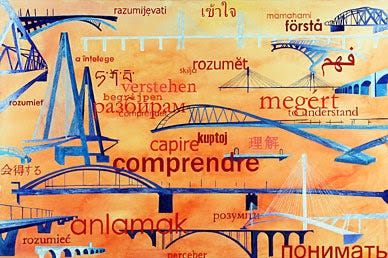Spicy Food, Spicier Wife: 3 Things This Gringo Learned Marrying into a Mexican Family
Spoiler alert: These 3 examples of the many things I have learned in my multicultural marriage are family-centered values, cultural adaptation, and the role language plays in family interactions.
I grew up a monocultural, monolingual American white boy in a small town in California. My wife, Isabel, also grew up in that same small town, just down the road a bit from where I lived. We met in 6th grade—a difficult year for me, considering the fainting in the library, that one time I threw up in class, and plenty of other stories that would normally make anyone else steer clear. Needless to say, it’s a miracle that I somehow convinced her to stick around.
We quickly became friends in middle school, then best friends in high school. It wasn’t until after we graduated that we started dating… but all that is a story for another time (stay tuned…?).
Rather, I wanted to use this short time I have with you to tell you about three of the things that I have learned to appreciate more—as a gringo—since marrying into my wife’s family:
Family-Centered Values
Cultural Adaptation
Language Barriers and Connection
Family-Centered Values
Very little in my life has made me happier than my niece introducing me as one of her “tíos” to her friends, or having the honor of manning the piñata at her birthday party. Those little experiences reminded me of the strong family ties that I was now a part of.
I learned very quickly that by marrying my wife, I was not just marrying her, but her entire family—her siblings, her parents, her cousins, her nieces and nephews, her aunts and uncles, even her grandparents. The sheer number of names to remember and individual hands to shake at each party or other gathering was a little daunting.
The family you marry into is just as important as the person you decide to marry.
Mexican culture often emphasizes tight-knit family units—often including extended family. My wife had very close relationships with virtually all of her cousins, aunts and uncles, and grandparents while she was growing up, most of them only living a couple hours drive from each other at the most.
I, on the other hand, did not. My cousins were all spread out across the entire country: some in northern California, some in Utah, some in Maine, etc. I didn’t get to see them very often, sometimes going 5-10 years without seeing a specific family member. Something I learned to appreciate about this family I married into is that closeness that I hope my kids have one day with their cousins, aunts and uncles, and so on.
Cultural Adaptation
Marrying into a Mexican family has exposed me to new many new things:
Tacos al pastor (and basically any other type of meat in a taco)? Delicious.
Awesome parties where you’re dancing until 2:00 am? Fantastic.
Tamales at Christmas? Spectacular. Give me 14 of them right now.
Extravagant birthday parties for 1-year-olds? Ok, I still don’t really get this one. I mean, the kid’s not going to remember any of it, right? But hey, it gives the family an excuse to have a fun party and the kid might have fun looking at the pictures one day.
BUT, weddings where you actually dance and eat a full meal, rather than just a greeting line and a doughnut wall ? Yes, PLEASE. (No offense to anyone who has chosen to have a doughnut wall; I just prefer my weddings to have a few more courses included.)
Now, I admit these examples are a little trivial, but they are included in the list of cultural differences I have come to appreciate as an outsider coming in. For example, needing to individually greet and shake the hand of every guest at a party when you arrive might seem daunting at first, but it allows you to get to know each of them, preserving those close ties I admire in point 1.
Language Barriers and Connection
The Spanish language has played a key role in my interactions with my wife’s family. (Look forward to my post, “Why Speaking (and Learning) Spanish is Important to Me,” coming soon.)
Many members of my wife’s family—grandparents, aunts, and uncles—either only speak Spanish, or speak very little English. And, if you know me, you know that this was a challenge I had to accept. I was not about to expect them to change to speak English with me when I had just as much of an opportunity to learn Spanish for them.
Learning Spanish has given me the opportunity to build meaningful connections with those family members that I would not otherwise be able to get to know.
Language learning builds bridges and expands horizons in ways not available otherwise.
For example, I am one of the few non-Mexican family members who can talk to my wife’s grandma, and I can participate in the group fun when all the family comes together, to the point where I was chosen, as I said in point 1, as the piñata guy at my niece’s party.
Making the effort to speak with someone in their own language has created so many relationships and opportunities for me in my life, that it feels almost selfish at this point to learn new languages. At the same time, I have been able to come to understand my wife’s Mexican heritage and culture more by learning the language tied to that culture.
People share more with you when they feel comfortable talking with you, and one of the ways I know I can help people be comfortable speaking with me is through learning their language.
Your Thoughts?
There are too many things I’ve learned and come to appreciate as a result of my multicultural marriage to include here in one post. Let me know if you’d like to hear more things I have learned, or if you would like me to go into more detail on any one aspect!
Like what you’re reading? Share The Global Mindset with someone you think might be interested, and let’s grow this global community!








Thanks for sharing your experience in a multicultural marriage, Garrett. Hope you continue to have these amazing experiences and moments!